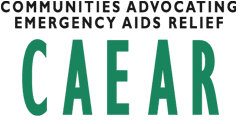
Google Groups: Part A Community | Part C Community | Grantee Resources




Statement of Ernest Hopkins, Chair, CAEAR Coalition, on President Obama's FY 2011 Budget Request For the Ryan White HIV/AIDS Program
February 1, 2010
This moment in the domestic HIV/AIDS epidemic demands bold action in the areas of prevention, treatment, care, housing and research. CAEAR Coalition calls on Congressional leaders to seize the priority President Obama signaled for the domestic HIV/AIDS epidemic and provide critically needed increases to the Ryan White HIV/AIDS program in the FY 2011 budget.
CAEAR Coalition appreciates President Obama's decision to prioritize HIV/AIDS in his budget. At a time of severe budget constraints, any increase is welcome; however, the president’s request falls well below the levels authorized by Congress in October 2009 when the Ryan White Program was extended for four years.
Our experiences on the frontlines of the epidemic—borne out by data on the number of people served or in need of service—show the president's proposed budget levels (attached) will not address the unmet needs in Ryan White Part A communities hit hardest by the epidemic.
The president requested an increase of $40 million (1.7%) for the entire program, with flat funding for the hardest-hit urban communities, as the demands on providers far outstrip existing resources. Community health clinics funded through Ryan White Part C are caring for 52% more people living with HIV/AIDS than they did in 2001, while funding has increased by just 11%. Similarly, the number of people living with HIV/AIDS over that period has increased by at least 33%, but treatment and care resources for the most-impacted Part A urban communities have increased by just 12%. The current high unemployment rates are also driving increased demand for publicly supported HIV and AIDS care.
Increased access to HIV testing and treatment and evidence-based interventions can reduce HIV transmission rates; now is the time for significant investments in the domestic response to the HIV epidemic.
The growing unmet needs of the uninsured and underinsured people living with HIV/AIDS increasingly undermine the public health budgets of cities and states nationwide. Without comprehensive health care reform the problem will only get worse. CAEAR Coalition will continue to engage both the Congress and Administration to bridge the increasing divide between health care needs and service access.
CAEAR Coalition · P.O. Box 21361 · Washington, DC 20009-1361 · Tel: 202-789-3565 · Fax: 202-332-7087 · Email: info@caear.org